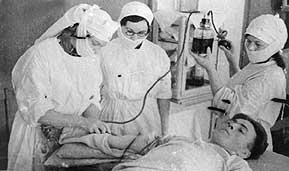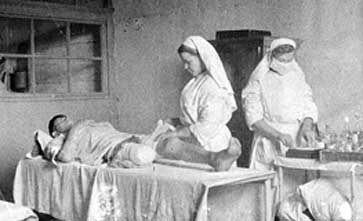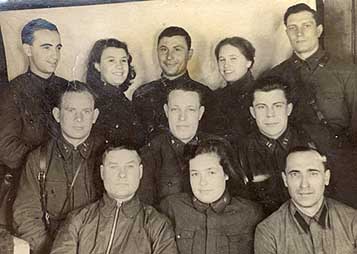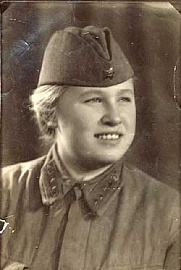The war started on a Sunday, and by Monday first aid courses had already been set up in our school. They taught us how to put on a cast, make injections, and dress wounds. That lasted for a short period of time, and then we started off for Kutuar on the night of July 6th. Our contingent was - schoolgirls and old men who wouldn't be drafted into the army. We marched almost 40 kilometers! Our feet were torn up to the point of bleeding. We reached a forest and set up tents. In the morning, the treatment of our feet began. Soon, they fitted us for uniforms, and then and there we took an oath. They listed me as a medic in a company. I was familiar with the Maxim machine gun and knew how to shoot it. I shot a rifle quite well too.
They transported us to El'na. What are opolchentsy [member's of the people's militia, irregulars] anyway? They knew nothing, couldn't do anything. None of these old people, who might have served at one time, could do anything. Many didn't know to shoot a rifle. The Germans attacked us. Everything was like in the movies - they surrounded us. You would see a wall moving right at you! And there we were, just the old men and us. We fled immediately, how could it have been different?! Then we got encircled. It was terrifying - weapons lying around, no one knew where to go, panic! How awful! And we were not traveling light, we had wounded with us. We drove out into a field: in which direction to move? Everything around us was burning. The commanders were running about, they didn't know where to go. We couldn't find our way out for a long time. There was this doctor, Klykov, and he tried to support us by saying, "Girls, keep in mind that no bomb will strike me. Stick close to me and don't be afraid." And indeed, when he was nearby, we weren't afraid of anything. And most importantly, all turned out to be well in the end. We carried all of the wounded out of the encirclement.
Then we left and reached the headquarters of some division. Here the Germans began to attack us! We were sent to remove the wounded. We dragged them from the battlefield in the ground sheets. There, this incident occurred. I was crawling from the headquarters with this ground sheet. Some older soldier had dug himself a small hole and was sitting in it. He said, "What are you crawling for? Jump in here!" I jumped. I could not sit there for too long! I sat for a little. I said, "I can't stay any longer!" I crawled forward, got a wounded soldier, and started crawling back. I crawled back to the trench, but there was a chunk missing from the soldier's head.
-A.D. What was in your first aid kit?
 |
In the first aid kit was iodine, materials for dressing wounds, individual first aid packets, and plain bandages and cotton, and powdered streptocide. There was nothing else, not even peroxide. Later we became messengers. Natasha (Natalya Nikitichna Peshkova) rode a horse well, so I learned too. We carried some documents. Gradually, they began to remove the girls from the front line and they took us first to the medical unit of our 63rd Regiment of the 21st Division. The regimental infirmary staff - it was two doctors and four nurses. We processed up to 300 persons per day! If the offensive comes, then the torrent is dreadful. There were Uzbeks and Tadjikis - there were many self-inflicted gunshot wounds. There were many fakers. They arrived continually: "Private is hurt!" The doctor told us, "Give small doses of the powder. Give one, if it doesn't go through, then give a second. Then say that it's the best you can do. If he says the pain is gone, then you know he's faking. If the pain stays, then we need to find the reason." There were public firing squad executions. I remember one. He had injured his arm or leg so he could get a loaf of bread. This became too common.
Then they transferred us to the medical unit of the division. Very often they set up hospitals in the forest, but it was rarely done in houses. We would arrive, clear an area for the hospital, set up the tent right there. We gathered berries, mushrooms, and birch juice for the wounded. The flood of wounded was such that we wouldn't sleep for days. The most terrible thing was the cold. The heater was a barrel filled with hot water, and as long as they heated it, it was warm, but when they stopped heating it, it got cold. They clothed us well, but there were such frosts! However, we seldom got sick. Our hands hurt really badly from gypsum [the plaster used to make casts]. It would get in your pores and you couldn't wash it off - our hands would burn horribly. Now you can give the injections and anesthesia, but back then all you could do was apply chloroform masks. So you would breathe that chloroform all day until you got dizzy yourself. But, you know, somehow we were oblivious to all these difficulties.
-A.D. How did you treat the wounds?
 |
We treated the wounds with peroxide, then only the edges with iodine, then Revonol and applied bandages. Bullet wounds in the chest cavity were the most typical. The arms. Less often - the stomach. There were no insanity cases, but many epileptics. First we put a clean layer of bandage on the wound, then the washed ones. We washed the bandages in the freezing weather. Because of this, I got frostbite on my hands twice. They needed to be washed, hung, rung out, and disinfected. Then we have four buckets of hot water on the stove at all times. Sometimes the doctor allowed us to take one bucket to wash ourselves. There was even an iron - to iron the clothes from lice. We tried to stay clean. The wounded soldiers had lice all the time. One time they got scabies, but we got rid of it quickly. They fed us twice a day - in the morning and in the evening. The army ration. In the morning - porridge, 35 grams of sugar and 600 grams of black bread, and for dinner, two plates of food. Natasha and I, stupid girls, they gave us the bread and sugar in the morning. We ate it all and had nothing left by evening. The more experienced medical assistants, they left a little bit of bread and sugar for the evening and we were jumping to get some. We were dressed like men. I was size 35 and they gave me these huge shoes and puttees! We were pretty lucky: We never performed guard duty.
-A.D. What was your job in the hospital?
I was a nurse. For operations, I got there before everyone else, got the instruments ready, boiled the water, and did the disinfecting. In one village we stopped and went to give blood transfusions to the seriously wounded. I was responsible for holding the square bottle with partitions. The doctor did the transfusion. The Germans flew over and a bomb fell on the facade of the building, destroying the roof, but it didn't explode. What happened? There was a box with medicines and first aid kits on the porch. Literally only half a minute before this the doctor said: "Nina, hand me a tourniquet." I just want to go to the box, and Professor Pokrovsky enters: "I'll get it." He was killed. Natasha got a concussion. And I only got a few scratches. When everything was settled down, it turned out that I was covered in blood - it was the blood from the broken blood container. It's awful to remember that now.
 |
N.Erdman is in the top row second from the right. Natalia Peshkova is in the bottom row in the center. |
There was another such incident. The hospital set up camp on the grounds of the Serpukhov Kremlin. Natasha and I lived in a house and in the evening we had ward duty. We had just come back and gone to bed when the alarm went off - the Germans were firing at the Kremlin from a long-range weapon. The order was that at the sound of the alarm, everyone was to go to the trenches. Natasha says: "We're not going anywhere! If it is our fate to die here, let's just let it happen." We didn't go. And what happened next was a projectile exploded in the crown of the tree, and fragments came down, and the many who were in the trenches were killed or wounded. Then they gave us a reprimand because we were not in the trenches!
-A.D. Have you ever had to treat a German?
I saw a German one time. At the very beginning, in '41, we shot down a plane. The pilot was wounded and was taken prisoner. He was truly like we had imagined them. Redheaded, large, and very tall. He was wounded in his bladder and had to have an operation. We had a remarkable female surgeon. When she came in, he announced: "I don't want a woman to operate on me!" We removed him from the table; we had no other surgeon. What the hell? We should have killed him. They always showed off and wanted some kind of rights here. During the night I was on duty with a historian, Professor Pokrovsky, who had also been in the opolchenie and then later was killed. We tied the German firmly to the bed. Nevertheless, all night he struggled and cursed. Thank God, he died toward morning.
-A.D. Did you celebrate the holidays?
We celebrated the holidays, there were dances, and now and then a mobile movie theater came. There weren't all that many affairs. We had one girl, 24 years old; she put on a lot of make up and went out with everyone, but us - no. My husband was in the hospital, that's where I met him. We dated for a long time and then got married. I was discharged as a Sergeant Major of the medical service. In November 1943, I left the army since I was expecting a child.
| Interview: | Artem Drabkin |
| Translated by: | Alyssa Nichols |


